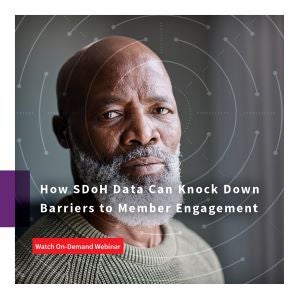Knocking Down Barriers in Healthcare With SDoH Data

The Value of Early Intervention
Plan members more engaged in their own care remain more likely to seek regular care, including prevention and wellness activities. People who prioritize their health enough to complete relevant health screenings and regular checkups increase their chances for catching a developing condition early. Treating a member at this stage can be exponentially easier and more cost effective compared to patients who initially present with advanced disease.
This early intervention strategy also makes sense from a business perspective – health plans that spend a little more money up front could save more in the long run.
How Can Precise Data Drive Success?
Members move and change phone numbers, physical addresses and email accounts frequently. This persistent problem requires ongoing efforts to keep contact information accurate.
Social determinants of health (SDoH) add another layer of complexity to staying in contact with and continuing to engage members. However, predicting how SDoH can alter member engagement can be challenging. Health plans need to consider ‘the big picture,’ or the interplay between the conditions in which people work, live and play, and the economic, political and social systems that determine those conditions.
Leave out SDoH and your plan risks allocating precious resources on less effective means to engage members. Incorporating these factors sends a strong message to members, particularly those in underserved areas or populations, that your plan understands their unique needs and challenges and that you value health equity.3 In fact, addressing these behavioral, social, environmental and economic forces can improve health care and wellbeing to a greater extent than clinical care itself, which one study revealed accounts for about 16% of member outcomes.4 Using data can help you knock down barriers in healthcare.
Webinar Executive Summary
In this Webinar, Adam Rarick-Varner, Senior Director of Healthcare Strategy at LexisNexis Risk Solutions speaks with Ken Walters, Senior Vice President and Chief Operating Officer of Community Care Plan. Moderator Doug Harris, Director of Content for Healthcare and Life Sciences at smartbrief, asks these two experts about the importance of accurate SDoH data in optimizing member engagement efforts. Find out how Community Care Plan successfully cleaned and updated their member contact information to help members with issues including food security, transportation and paying for utilities.5 Resolving these and other day-to-day challenges means members can pay more attention to their health, better managing their chronic conditions and become stronger partners in their own care.
References
- https://www.firstdollar.com/blog/are-members-aware-of-their-benefits
- https://www.ncbi.nlm.nih.gov/pmc/articles/PMC6996004/
- https://risk.lexisnexis.com/insights-resources/white-paper/using-healthcare-data-to-drive-greater-health-equity
- https://www.sciencedirect.com/science/article/abs/pii/S0749379715005140
- https://www.who.int/health-topics/social-determinants-of-health#tab=tab_1.
Download for More Webinar Insights

